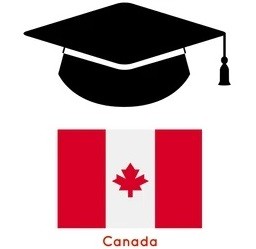Cost Of Studying In Canada For Indian Students
64e32f0ff2ec4.jpg)
Although studying abroad can be expensive, Canada is one location where exceptional education is offered at tuition prices that are lower than those of many other nations. Canada is a highly sought-after location for higher education, offering undergraduate, postgraduate, doctorate, and vocational programs to students from all over the world. According to the Canadian Bureau of International Education, Canada has the third-highest proportion of international students globally. In addition, short-term courses and undergraduate and graduate credentials are available through Canadian universities. Students have the option of attending community, public, or private colleges. The University of Toronto, the University of Alberta, and the University of Winnipeg are a few of Canada's most esteemed universities.
The quality and diversity of the Canadian educational system make it possible for students to pick a programme that meets their needs. In addition, Canada provides overseas students with a range of grants and scholarships that can support their academic endeavours without placing an undue financial strain on them. Studying in Canada is regarded as a worthwhile investment for your future since you will have access to outstanding education, cross-cultural encounters, and a degree that is recognised throughout the world. A financial commitment and advance planning are necessary for international students to be accepted into Canadian institutions and colleges. Additionally, many study abroad consultants in Kerala will help you manage costs, accommodation, universities, and all other needs for your study abroad journey.
Significant Expenses for Indian Students Studying in Canada
The main expense for Indian students studying in Canada, like in other nations, will be tuition fees. Numerous scholarships and funding opportunities are offered by specific prestigious colleges and universities to help cover students' tuition fees. Additionally, the cost varies depending on the major a student wants to pursue at a specific college. Here is a list of additional costs that affect the total cost of studying and living in Canada.
* The charge for applying to college
* Accommodation and food
* Transportation and commuting
* Cost of work permit and study permit
Course Average Tuition Fee Per Annum
Application fees CAD 50 - 200 (INR 3,700 - 14,830)
Undergraduate Courses CAD 12,000 - 30,000
(INR 6,46,000 -16,15,000)
Engineering & Medicine Courses CAD 22,000 (INR 11,69,000)
(UG Level)
Humanities, Business & Management CAD 5,500- 6,500
(UG Level) (INR 2,96,000 - 3,50,000)
Law CAD14,000 (INR 8,45,600)
Visual and Performing arts CAD 5,000 (INR 3,01,800)
Postgraduate Courses CAD 18,000 (INR 9,54,000)
MBA CAD 28,000 (INR 14,75,000)
Executive MBA CAD 29,000 (INR 17,51,400)
Engineering CAD 19,300 (INR 11,57,200)
Dentistry CAD 22,500 (INR 13,47,300)
Nursing CAD 47,800 (INR 28,65,600)
Other Expenses to Study In Canada
Accommodation CAD 5000 - 10,000
(INR 2,67,000 - 5,39,000) per annum
Food CAD 300 - 400 (INR 17000 - 44000) per month
Travel Costs in Canada are CAD 80 -110 (INR 4,300 - 6,000) per month
Entertainment CAD 750 (INR 43,770) per month
Work permit fees CAD 155 (INR 11,943)
Campus Parking CAD 650 or more
Books and School supplies CAD 1000 - 2000
Health And Insurance Cost
Because students are required to have health insurance prior to the start of their programme, it is included in the overall estimate of the cost of studying in Canada. The overall cost could vary from CAD 300 (INR 17,000) to CAD 800 (INR 44,000) per year, depending on the type of coverage chosen.
Study Permit Fees
International students are permitted to study in Canada with the help of a study permit, which is a document issued by the Canadian immigration authorities. International students must have a valid study permit in order to enrol in classes in Canada. The cost of a study permit in Canada is CAD 150, or approximately INR 8,873.
Proof of Funds
International students must provide proof of funding, an admission letter, and other documentation in order to obtain a student visa. INR 6,00,000 in bank reserves is needed to apply for a one-year student visa to Canada.
Taxes In Canada
Depending on your residency status, you may need to file Canadian income tax returns if you're an international student studying in Canada. The benefits of filing taxes, such as GST credits, the Child Tax Benefit, or obtaining a refund, might be advantageous even if overseas students are not acquiring citizenship in the nation.
Students must file an income tax return if they receive income from investments, jobs in Canada, research assistantships, or teaching. Even students who get income from sources outside of Canada are required to disclose their earnings.
To know more about the cost of studying in Canada for Indian students, read this;
Conclusion
One of the most well-liked locations for students looking to enhance their education is Canada. The cost of studying in Canada is quite affordable when compared to nations like the United Kingdom and the United States.
Related Blog

Why study Hospitality Management in the UK?
 (1)664aed680a8e9.png)
10 Easy Steps to Get a Study Abroad Scholarship
 (1)66437fcf8db2c.png)
Self-Application or Study Abroad Consultant: Which is Better?
6643606f06693.png)
What are the potential challenges of studying abroad, and how to overcome them?
6628d683c5c4c.png)
Budgeting Tips for Studying in Australia

How do I apply for a Master's at Canadian universities?

How to Prepare for a Canada Student Visa Interview?

How to Improve Your Communication Skills For Abroad Studies

A Comprehensive Guide To Applying For A PG Work Permit In Canada
65a670c6772ef.jpg)
UK Student Visa: New Rules from 2024 Applications

Top Colleges In Canada For MBA Without GMAT

Part-Time Jobs in Canada

Preparing Invitation Letter For Canada Visa: All You Need To Know

Cost Of Studying For Indian Students In The UK

Visa requirements for Indian students to study abroad in the UK

GRE Accepting Universities In The USA

Public Vs Private Universities - Which Is Better?

How To Apply Student Visa For The USA?
6505864a3be98.jpg)
Best Interior Design Programs In The UK
64fee13f97d75.jpg)
Difference Between SDS and Non-SDS Visa Applications
64f5f29debd74.jpeg)
Reasons Why You Should Study Hospitality Management In The UK?
64f09d22881c9.jpg)
What Are The Short-Term Study Abroad Programs For Indian Students?

How do I write an effective SOP for UK Universities to get visa assistance?
64df3a0b57710.jpg)
How to Find Student Accommodation in France?
64da4a92186d6.png)
What are the Reasons Students Choose Nursing as a Career Abroad?
64d5f2456ddca.jpg)
How to Find Paid Internships in Canada for Indian Students in 2023?

Things were a Culture Shock For an Indian Students in the UK
64cce0d0e81c5.jpg)
Tips For Overcoming Language Barriers For Indian Students Studying Abroad

How Can Internship Abroad Expand Your Career Horizon?

How to Find Student Accommodation for Indian Students in a Foreign Country

Which are the Main Scholarships by Australian Universities for Indian Students?

How to Prepare for Duolingo English Test?

What are the Preparations You Take Before Your IELTS Test?

How to Get a Graduate Assistantship in the USA to Students?

What are the Safety Tips for Indian Students Studying Abroad?

What are the Tips for Winning an MBA Scholarship in the UK?

How to Get Eight Bands in IELTS Speaking?

Which are the Leading Universities in the UK for Indian Students?

How do Indian Students Get into Law Universities in Canada?

What are the Trending Courses to Study at Universities in Canada?

What are the Different Health Science Courses Available in Canadian Universities?

Studying in the UK vs the US: Which is Better For Students?

Tips for Indian Students to Adjust to a New Culture while Studying Abroad

Jobs and Internship Opportunities for Indian Students while Studying Abroad

How to Choose the Right Course for Study Abroad

Popular Destinations for Indian Students to Studying Abroad

Scholarships and Financial Aid for Indian Students to Studying Abroad

How to Prepare for Standardised Tests like TOEFL and GRE for Studying Abroad

Why is Studying Abroad Good for Your Career?

Things to Consider When Choosing an Overseas Educational Program

How to Manage the Funds for your Study Overseas?

Studying Abroad on a Budget: Tips for Making it Affordable
642d3ed3db028.jpeg)
Scholarships and Funding Opportunities for Indian Students to Study Abroad

Tips for Preparing to Study Abroad: From Application to Departure

Benefits of pursuing an MBA from Canada

Things to Consider Before Choosing a Study Abroad Destination

How much does it cost to study abroad?

How to get a student visa for studying abroad?

How to choose your university to study abroad

Why do Indians prefer to study abroad?

How to get an education loan in India to study abroad?

What are the factors influencing students to study abroad

Top 10 Study Abroad Consultants in Kerala

Most reputed study abroad consultants for UK education

